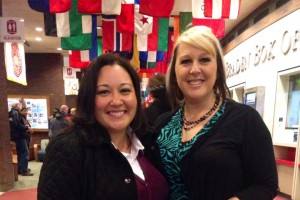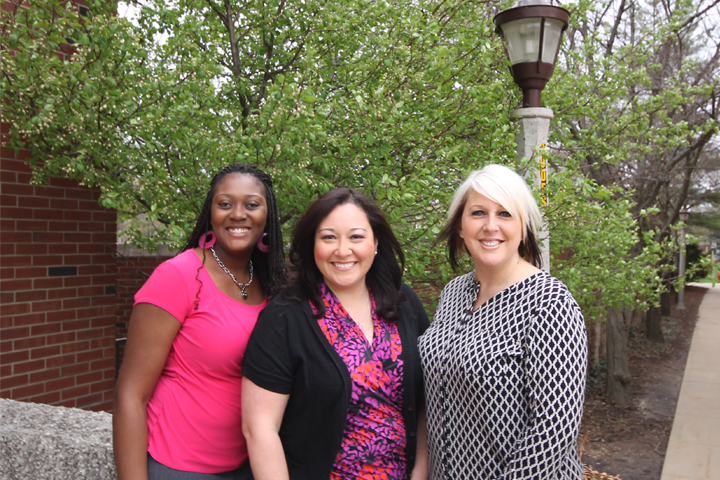To prepare the best, Illinois State must recruit the best. This spring three College of Education faculty members in the Department of Special Education were recognized at the University and national levels for excellence in teaching and research.
The work that led to Yojanna Cuenca-Carlino earning the 2014 University Research Initiative Award was focused not only on providing new and important strategies for the field, but concurrently training practitioners to use them.
“Research is a good way to inform the field, but what about involving teachers in the research process?” said Cuenca-Carlino. “For the past 20 or 30 years, we have been talking about the research-to-practice gap, but why not unite and see teachers as partners? With this in mind, my research philosophy has involved getting administrator and teacher ‘buy-in’ and then training and supporting the practitioner through implementation of effective intervention practices.”
Cuenca-Carlino’s research focuses on providing writing strategies for students with emotional and behavioral disorders (EBD) through the self-regulated strategy development (SRSD) model. She is among a small group of researchers that is investigating the value of these strategies to EBD populations, who she said generally receive less attention across special education research. In fact, she is an author for two of the four published studies in the field where teachers have directly been trained to provide this intervention to students with EBD. She also is in the process of conducting another of these studies with the help of her colleague, Assistant Professor April Mustian. Cuenca-Carlino has also recruited the help of her undergraduate students who expressed an interest in the research.

Assistant Professors in the Department of Special Education April Mustian and Yojanna Cuenca-Carlino following the Founders Day Convocation. Mustian earned the University Teacher Initiative Award while Cuenca-Carlino earned the University Research Initiative Award.
“That’s how I learned to conduct research, so I try very hard to also invite my students to get involved,” she said. “In fact, one of the students will be a coauthor on the manuscript when we prepare it for publication.”
Cuenca-Carlino’s work is linked to the United States’ underperformance in the area of writing, which has not been served through the major reform efforts in math and reading. She said students with EBD are lagging even further behind their peers. Yet, writing holds great potential for improving academic as well as social, emotional, and behavioral outcomes.
“These students often do not think through their decisions or spend time thinking about other peoples’ perspectives, and they have difficulty self-advocating and having self-determination skills like goal setting and monitoring their own learning,” Cuenca-Carlino said. “This research has combined persuasive writing with self-advocacy and empowers students to advocate for what they need, not just by speaking to someone, but through writing. Writing has been immensely therapeutic for these students as well.”
Stacey Jones-Bock, the chair of the Department of Special Education, said Cuenca-Carlino possesses one of the best approaches to research she has ever seen, and it’s paying off in the field and in teacher education at Illinois State.
“She is incredibly passionate about involving teachers as a scholar, and is out to change practices to improve education for students with disabilities,” Bock said. “She is always thinking three steps ahead, and in just her fourth year, she is now mentoring new faculty members in the area of research.”
University Teaching Initiative Award
The Department of Special Education was also recognized for its work in the higher education classroom. Mustian, who teaches courses in special education for students at the undergraduate, master’s, and doctoral levels, earned the 2014 University Teaching Initiative Award.
“What motivates me, and what keeps me so passionate, is knowing that I am not only accountable to my students who are going to be future teachers but to the students for whom they soon will be responsible,” Mustian said.
In reflection of her current teaching philosophy, Mustian recalls an influential mentor from her doctoral program at the University of North Carolina at Charlotte, Professor Charles Woods.
“He had high expectations for us,” Mustian said, “and he showed us how to make learning engaging at the higher education level. It is because of him that I learned how to retain my personality—remain who I am when I teach—while keeping high expectations for my students.”
Mustian said she places emphasis on “practicing what I preach” to students through modeling. In this form of instruction, she employs instructional strategies such as guided notes and response cards in the same manner in which her students would implement them in their future classrooms. She attributes much of her development as an effective teacher educator to her colleagues within the department, who foster a collaborative culture that encourages all to grow and improve.
“We are a department full of strong teachers because we value teaching,” Bock said. “It is a priority for us; we basically feel that if you are going to be educating teachers how to teach, you need to be a fantastic teacher. April is at the top of that fantastic list.”
In 2012, Mustian began to comprehensively integrate cultural responsiveness in her curriculum thanks to a course redesign grant that allowed her to take immersion trips to Chicago and engage with the College of Education’s Chicago Teacher Education Pipeline (CTEP). Mustian, who served as a special education teacher and researcher in an urban North Carolina school district early in her career, said the experience allowed her to develop course curricula that help teacher candidates meet the challenges they will face in these districts.
“CTEP really reignited a passion in me. They re-centered my focus and I can now prepare culturally competent teachers in a way that I was previously not prepared to do,” she said.
Dissertation of the year
Mustian (2010), Cuenca-Carlino (2012), and now Assistant Professor Shaqwana Freeman-Green all hold the same distinguished honor—they each received a dissertation of the year award from national education organizations. Freeman-Green, who is finishing up her first year with Illinois State, was recognized in April for the award by the Council for Exceptional Children, Division of Learning Disabilities.
Her research utilized the SOLVE Strategy for learners who are struggling with math word problems. Her work has been immensely valuable for the Department of Special Education, which is the process of a curriculum redesign that provides teacher candidates with more education on literacy and math strategies.
“Shaqwana brings to the table an area of specialization we needed to prepare future educators,” Bock said. “She is a lead writer on redesigning our math methods course, and on top of that, she is a phenomenal teacher.”
Freeman-Green said her research topic arose from a problem she witnessed while teaching in middle level classrooms. Students who struggle with algebra cannot move on to mathematics courses that will enable them to pursue a degree from a higher education institution. She is hoping to help reverse this trend by adding her approach to the toolkit of teacher candidates.
“The approach encourages students to ‘attack’ word problems,” Freeman-Green said. “The most important point I make when I am training teacher candidates to use the strategy is that it gives the students a place to start. Most of the time, getting started is half the battle.”
Freeman-Green has already begun to expand upon her work. Like Cuenca-Carlino, she is providing the opportunity for an undergraduate student to contribute to the research, and has enlisted the support of the Unit 5 school district to further test her application of the SOLVE Strategy.
The work taking place in special education at Illinois State is inspiring. The quality of the teachers it prepares is a direct result of the well-rounded faculty and staff who demonstrate excellence in teaching and research.
“We look for people who are strong in teaching, scholarship and service,” Bock said. “And while these awards celebrate one side of their work in which they excel, they are each strong in all three areas. They have a passion for teaching, went through great training programs, and their research was already solid.”
For more information on faculty research in the Department of Special Education, contact SpecialEducation@IllinoisState.edu.

